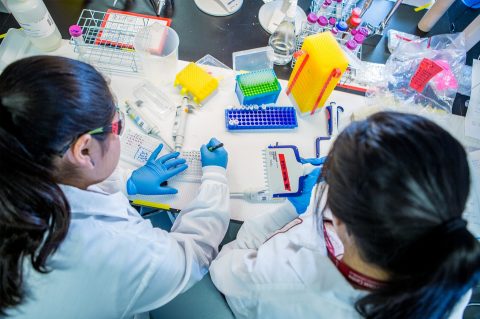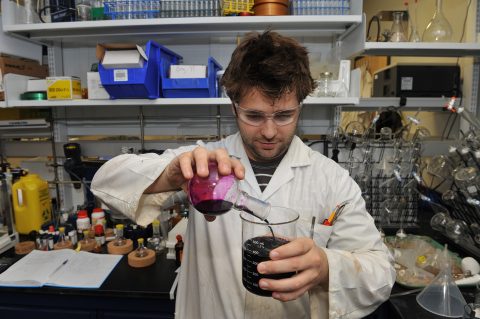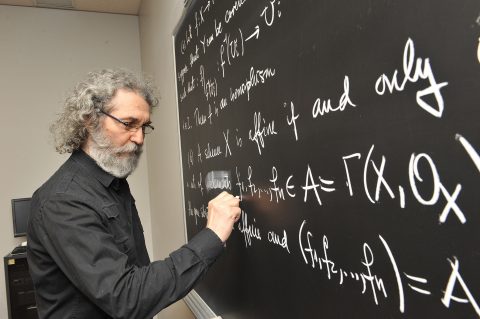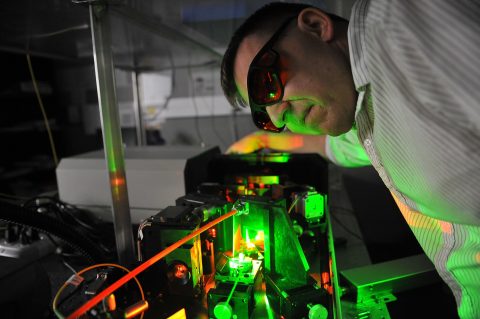Multidisciplinary Studies in Science (Minor)
Why study Multidisciplinary Studies in Science?
The Science College offers highly motivated students in any of the sciences a multidisciplinary program that prepares you for a life of scientific thought and research. In this program — while majoring in your own discipline — you also participate in scientific research projects in each of your three undergraduate years. You’ll take courses that highlight the interrelated nature of the sciences, and you and other Science College students will wrestle with scientific problems, talk with professors and propose new ideas for discussion. This is a challenging program. Usually, Science College students appear as co-authors on papers based on their research.
Special funding for out-of-province students
Up to $4000 for undergraduate programs.
Program structure
Program options
- Minor in Multidisciplinary Studies in Science (24–30 credits)
Students must enrol in a science program that leads to a Bachelor of Science (BSc) degree in order to be part of the Science College. Students registered for a Bachelor of Computer Science (BCompSc) or a Bachelor of Arts (BA) may be eligible as evaluated by the College. This minor is only available to students enrolled in a specialization, honours or major.
Students in the College must obtain a minimum grade of “B-” in all courses of their major, specialization or honours program and in all courses offered by the College. Please note that some courses may be repeated twice for credit in this program, provided the subject matter is different each time.
Courses
The minor in Multidisciplinary Studies in Science consists of 30 of the 90 credits normally required for a BSc degree. These courses have been developed specifically for the College with the intention of providing a unique, integrated program of science education. In addition to completing the core curriculum, students are responsible for satisfying their individual degree requirements leading to a Bachelor of Science (BSc).
United States students: A U.S. Federal Student Aid-eligible version of this program is offered. This version meets all U.S. regulations (such as no co-operative education or e-courses) for eligible programs.
Admission criteria
Minimum cut-off averages and course requirements
- Quebec CEGEP: 28
- Calculus 1 and Calculus 2 and Linear Algebra – Mechanics, Electricity and Magnetism and Wave, Optics and Modern Physics – General Chemistry and Chemistry of Solutions – General Biology OR Natural Science DEC OR DEC intégré en sciences, lettres et arts.
- Additional information for CEGEP applicants
- High School: B+ overall, A- in math / sciences
- Completed courses in the disciplines of Calculus, Biology, Chemistry and Physics.
- One math from Pre-Calculus, Calculus, or equivalent
- Two sciences (from Biology, Chemistry or Physics)
- ACT or SAT is NOT required
- Canadian curricula course requirements
- Accepted international qualifications
- Completed courses in the disciplines of Calculus, Biology, Chemistry and Physics.
- International Baccalaureate (IB) diploma: 31 overall, 5 math, 6 science
- one math (Applications and Interpretations HL, Analysis and Approaches HL or Analysis and Approaches SL)
- International Baccalaureate Career-related Programme (CP): 5.1/7 overall, 5 math, 6 science
- one math (Applications and Interpretations HL, Analysis and Approaches HL or Analysis and Approaches SL)
- Additional Career-related Programme (CP) course requirements
- Baccalauréat français: 14 overall, 15 in math / science
- Première: Spécialité mathématiques AND Spécialité physique-chimie
Terminale: Spécialité mathématiques (also accepted, Spécialité Physique-Chimie AND Mathématiques Complémentaires)
- Première: Spécialité mathématiques AND Spécialité physique-chimie
- British system of education (GCE):
- A-levels: At least two A-level exams CD, C in math, D in science or
- AS-levels: At least 4 AS-level exams with equivalent results or
- BTEC: Level 3 Diploma or Extended Diploma in a related subject area with equivalent results
- Students without math or science A-levels may be admissible based on AS-level or iGCSE/GCSE/O-Level exam results. Students should include all their exam results from iGCSE (or equivalent) onwards to support their application.
- Additional information for British System of Education (GCE) applicants
- University Transfers (internal/external): B+ overall, B+ in math / sciences
- Completed courses in the disciplines of Calculus, Biology, Chemistry and Physics.
Additional requirements for admission
Personal interview
Only students who have been accepted to or are already registered at Concordia may be invited to a personal interview to assess their admissibility to the Science College. Each year, 20 to 25 students are chosen from this interview process which evaluates their:
- Academic standing/grades*
- Experience in natural sciences in an academic setting
- Wide-ranging interest in the sciences
*Note: Grades are assessed before prospective College applicants are potentially selected to be interviewed.
Additional factors
The College also considers additional factors during the application process, especially for individuals who:
- Show exceptional motivation
- Think critically, creatively and methodically
- Demonstrate a strong sense of initiative
- Possess a natural curiosity about the world
Motivated students whose grades may not fully reflect their potential often become top achievers at the College. Candidates who are accepted to the College receive a letter that they must complete and return to confirm their decision.
Minimum cut-off averages should be used as indicators. The cut-off data may change depending on the applicant pool. Applicants who meet the stated minimum requirements are not guaranteed admission to these programs.
Application deadlines

FALL ENTRY (September)
Deadline: March 1
U.S. and international applicants: Apply no later than February 1 to allow time for immigration document processing. However, applying earlier is strongly recommended. Immigration processing times vary by country and delays could prevent you from starting your studies on time.

WINTER ENTRY (January)
Deadline: November 1
U.S. and international applicants: Apply no later than August 1 to allow time for immigration document processing. However, applying earlier is strongly recommended. Immigration processing times vary by country and delays could prevent you from starting your studies on time.
We reserve the right to close admission to a program at any time after the official deadline without prior notice.
After your degree
Thanks to Concordia's emphasis on taking an interdisciplinary approach to your field of study, you'll graduate with a depth of knowledge informed by an understanding of how your subject connects to the wider world. You'll be ideally positioned to succeed in a professional role that demands rigorous analytical thinking, sharp communication skills and the ability to approach problem-solving from multiple dimensions.
Other programs of interest

Get inspired by life. Immerse yourself in the study of life at all levels: from the edge of biochemistry through cell biology and the physiology of multicellular organisms to the interactions between organisms and their environment.
Department
Faculty

As a chemist, your mastery of chemical reactions could lead to the creation of environmentally-friendly materials like compostable plastics or medications that fight disease.
Department
Department of Chemistry and Biochemistry
Faculty

Mathematics is a language that answers real-world questions in science and engineering. Statistics is the science of information.
Department
Department of Mathematics & Statistics
Faculty

Today physicists build lasers, design medical imaging machines and develop applications for nanotechnology.
Department
Faculty

Modern scientific psychology studies brain processes and behaviour — both human and animal — under various conditions.
Department
Faculty

